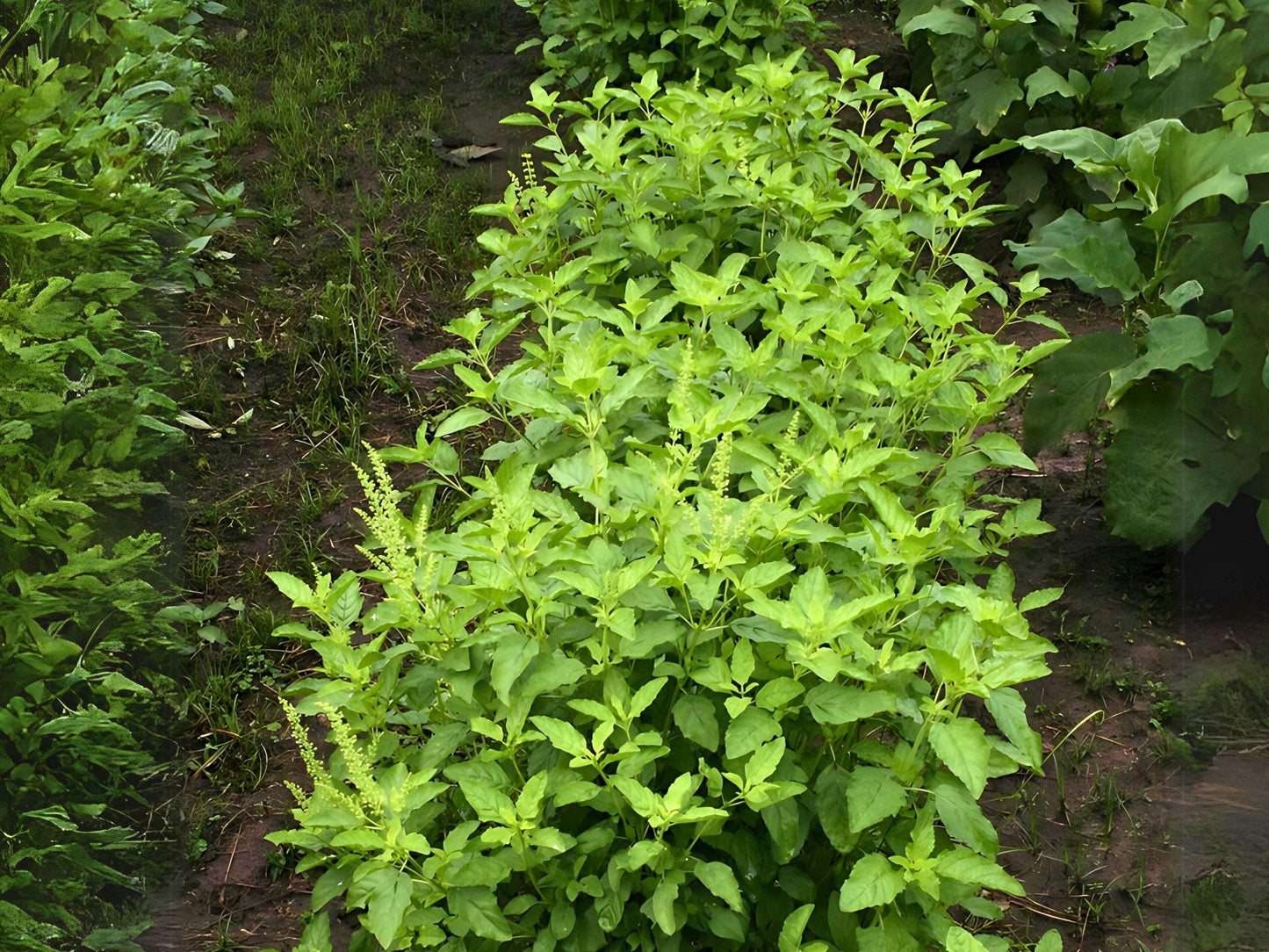Holy Basil (Ocimum tenuiflorum), also known as Tulsi, is a revered herb native to southern Asia, often referred to as "The Queen of Herbs" for its medicinal, culinary, and sacred uses. This Ayurvedic herb is highly valued for its spicy, aromatic leaves, which are commonly used in teas, cooked dishes, and traditional remedies. With its compact growth habit and striking dark purple flower spikes contrasted by white blooms, Holy Basil is not only beneficial but also a beautiful addition to any garden.
Tulsi attracts bees, butterflies, and other beneficial insects, making it an excellent choice for pollinator gardens. It’s easy to grow and may reseed itself, ensuring a continuous supply of fresh leaves. For year-round benefits, Holy Basil can be grown indoors throughout the winter, providing a steady source of fresh leaves for teas and culinary uses.
* SCROLL DOWN FOR DETAILED GROWING INFO *
All Nimble NiteCap Seeds are:
• Heirloom
• Organic
• Non-GMO
• Open Pollinated
• Untreated
• US Grown
• Growing instructions included
• Regular testing is conducted to uphold the highest germination standards, all the while employing appropriate seed storage techniques.
Sustainable Packaging & Shipping:
• NimbleNitecap seeds are packed in eco-friendly, compostable seed packets. Seed packets are printed in house with vegetable-based inks on biodegradable, recycled materials. (Small plastic bags are infrequently used to prevent the loss of very small seeds.)
• All orders are carefully packed and shipped with tracking via USPS First Class (or Priority, if selected) in padded ECOENCLOSE recycled and reusable mailers, or recycled boxes to protect your items in transit.
Most orders ship out the same or next business day! Please note that this time may be extended during peak season.
• FREE SHIPPING on all orders of $35 or more. Flat Rate shipping no matter how many packets you order.
* DIRECTIONS *
Common Names: Holy Basil, Tulsi
Latin Name: Ocimum tenuiflorum
Type: Herb
Life Cycle: Annual in most regions; perennial in USDA zones 10-11
USDA Zones: 10 - 11 (grown as an annual in other zones)
Stratification: Not required
Germination Ease: Moderate
Sunlight: Full Sun to Partial Shade
Moisture: Prefers consistently moist, well-drained soil
Soil: Rich, well-drained soil with a pH between 6.0 and 7.5
Height: 12-24 inches
Spread: 12-18 inches
Color: Bright green leaves with dark purple stems and white flowers
Bloom Season: Summer
Companion Plants: Excellent companion for tomatoes, peppers, and eggplants. Repels pests like aphids and whiteflies.
Climate Adaptability: Adaptable to warm climates; can be grown indoors year-round
~ Sowing ~
When to Start Inside: 6-8 weeks before your average last frost date.
When to Start Outside: Sow seeds directly in the garden after the last frost when the soil has warmed to at least 70°F (21°C).
Planting Depth: Sow seeds ¼ inch deep.
Watering: Keep the soil consistently moist but not waterlogged.
Light and Temperature: Holy Basil prefers full sun to partial shade and warm temperatures between 70-85°F (21-29°C).
Germination: Seeds typically germinate in 10-14 days.
~ Transplanting Seedlings Outdoors ~
Timing: Transplant seedlings outdoors after the risk of frost has passed and the soil is warm.
Location: Choose a sunny to partially shaded location with well-drained soil.
Spacing: Space plants 12-18 inches apart to allow for adequate growth and air circulation.
Transplanting: Gently transplant seedlings into the prepared soil, ensuring the root ball is covered and the plant is stable. Water well after planting.
~ Growing ~
Watering: Water regularly to keep the soil evenly moist. Mulching can help retain soil moisture and keep roots cool.
Fertilizing: Holy Basil benefits from a balanced fertilizer or compost worked into the soil before planting. A light side-dressing of compost or fertilizer can be applied every few weeks during the growing season.
Pest and Disease Management: Monitor for pests such as aphids and spider mites. Use organic pest control methods such as neem oil or insecticidal soap. Ensure good air circulation to prevent fungal diseases.
Maintenance: Pinch off the flower buds to encourage leaf production and prevent the plant from going to seed too early.
~ Harvesting ~
When to Harvest: Harvest leaves as needed, typically 60-70 days after sowing.
How to Harvest: Pinch off individual leaves or cut entire stems just above a leaf node. Harvest regularly to encourage new growth.
Drying and Storing: Basil is best used fresh. For long-term storage, Holy Basil leaves can be dried or frozen.
~ Seed Saving ~
Allow one or two plants to flower and produce seeds. Once the seed heads have dried, collect the seeds and store them in a cool, dry place for future planting.
~ Additional Information ~
Forage for Pollinators: Holy Basil flowers are highly attractive to bees and other pollinators.
Origin: Native to southern Asia, particularly India, where it is revered in Ayurvedic medicine.
Nomenclature: The genus name "Ocimum" comes from the Greek word for fragrant, reflecting the plant’s aromatic qualities. The species name "tenuiflorum" refers to the slender flowers.
History: Holy Basil, also known as Tulsi, is one of the most sacred herbs in Hinduism and has been used for thousands of years. It is considered a symbol of protection in many cultures.
Climate Adaptability: Thrives in warm climates; best grown as an annual in most regions, but can be grown indoors year-round for continuous harvest.



















